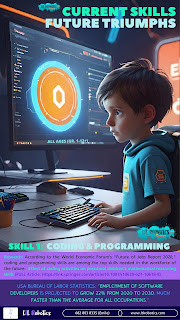The advent of the Fourth Industrial Revolution is reshaping global labor markets, creating disruptions and disparities across industries and economies. Wiley has introduced the Digital Skills Gap Index (DSGI), a vital tool for assessing progress in digital skills development amid this transformative era.
The definition of "digital skills" under the "APEC Roadmap to Closing the Digital Skills Gap by 2030" encompasses various competencies, including data science and analytics (DSA), artificial intelligence, cybersecurity, digital literacy, and skills for emerging technologies.
The "digital skills gap" refers to the mismatch between the demand for workers with digital skills and the available supply, while "digital skills readiness" measures the preparedness of workers to meet the demands of the digital age through upskilling and reskilling.
The DSGI 2021 indicates widespread failure in bridging the digital skills divide across economies. This gap is exacerbated by inconsistencies across the Index's six (6) Pillars, with countries excelling in some areas while lagging in others.
The 6 Digital Skills Gap Index Pillars:
Index Pillar 1: Digital Skills Institutions
The Digital Skills Institutions pillar considers both core (e.g., maths literacy) and higher-level (e.g., tertiary graduates in IT subjects) digital skills, assessing institutions’ accomplishments in this regard from an output perspective. Education and training availability and competencies (e.g., availability of corporate digital staff training, the enablement of teachers and faculty in data science and analytics) further reflect an economy’s institutional strengths.
Index Pillar 2: Digital Responsiveness
This pillar evaluates the responsiveness of skills development and education systems to shifting digital skills demands and employers’ ever-evolving digital skills requirements. Included in the assessment are baseline quantifications of current digital and science and technology skills, as a measure of digital resilience in the face of ongoing change.
Index Pillar 3: Government Support
Pillar 3 acknowledges the role of government in bridging the digital gap—through a deep understanding of, and commitment to, closing the digital skills gap. This support typically requires a national digital vision and entails coordination with employers and academia, and effective ICT promotion more broadly.
Index Pillar 4: Supply, Demand & Competitiveness
This, the most important pillar, collates and combines several key indicators of the digital divide (and its impact on competitiveness): the digital skills employer-job seeker mismatch, the STEM gender gap, the ease of finding/hiring staff and access to foreign talent to bridge the gap.
Index Pillar 5: Data Ethics & Integrity
Data ethics and integrity, including issues around cybersecurity, are integral to sustained and sustainable digital development.
Index Pillar 6: Research Intensity
The Research Intensity pillar profiles academia’s focus on digital subjects, examining the level of applied digital research is evident in local contexts.
What Skills are Sought after?
A full array of digital skills is key for job generation. Broadly defined, the skills needed to operate and succeed in the modern knowledge-based economy requires familiarity with digital tools, but it also demands critical thinking, problem solving, and effective communication and collaboration. Integrating cutting-edge digital skills while increasing these complementary “workplace” skills is an additional challenge. It is this aspect of learning where the skills gap is particularly severe and needs to be addressed expeditiously.

As economic activities increasingly transition to digital platforms, there's a growing cost for entities falling behind in digital skill acquisition. Companies with advanced digital assets are reshaping industries, altering the competitive landscape.
The pandemic has accelerated the structural shift towards digitalisation, highlighting the importance of digital skill development for economic resilience. Success in the digital age hinges on countries establishing leadership in digital skills development and educational institutions effectively bridging the digital divide for their students.
In Conclusion:
Digital literacy is indispensable in today's world, offering access to information, enhancing communication, nurturing critical thinking and creativity, opening up career opportunities, ensuring safety and security online, promoting empowerment and participation in society, and facilitating lifelong learning. It is essential for navigating the digital age successfully and preparing individuals, including children, for a future where digital skills are fundamental to success and well-being.

.png)

.png)

.png)
.png)
